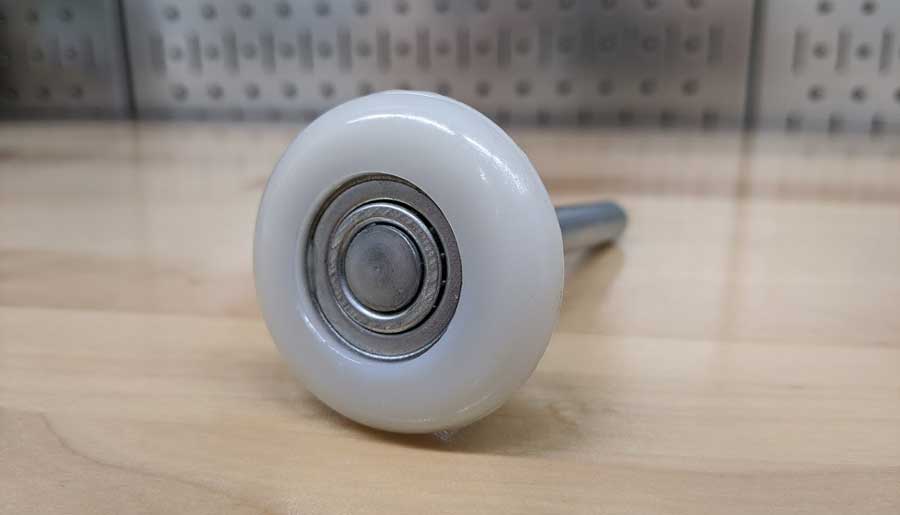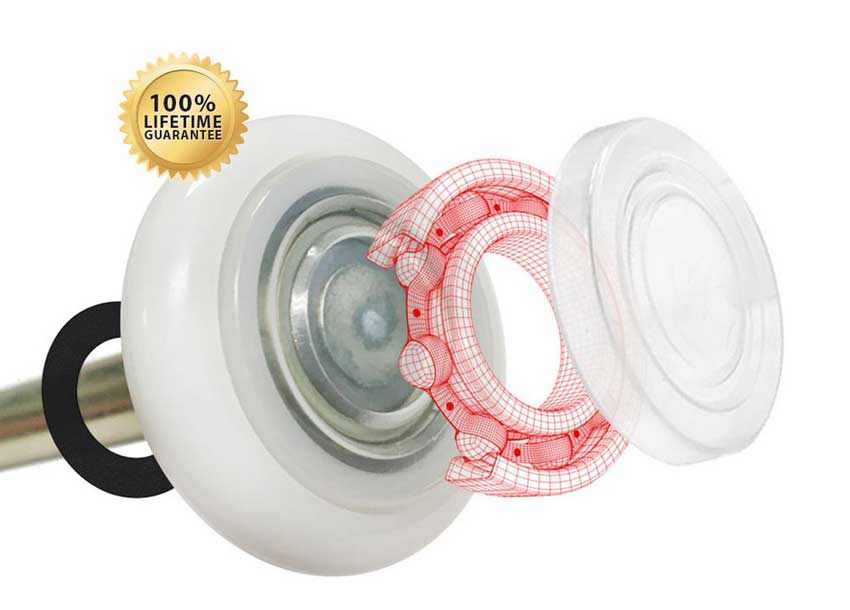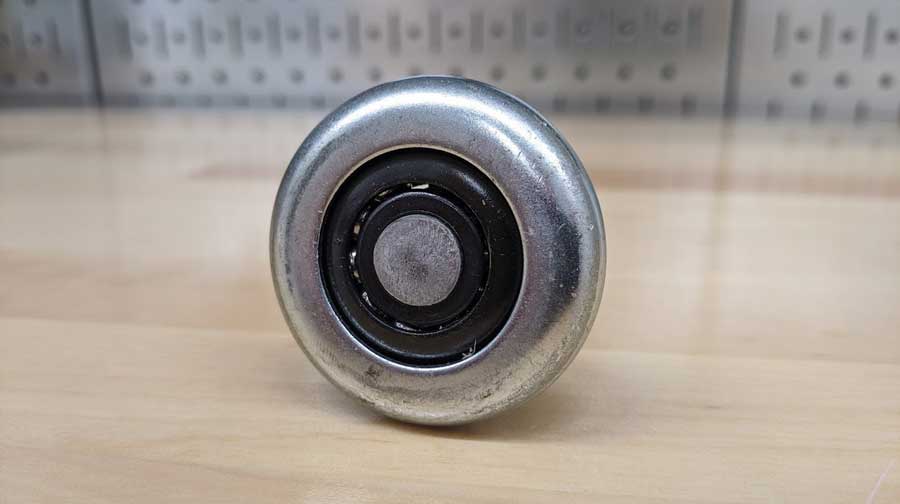If you’re like me, you probably thought all garage door rollers were the same. But if you’re considering replacing your old, worn-out garage door rollers, you’ll want to keep reading.
Choosing between nylon vs steel garage door rollers has a massive impact on your garage door.
There’s one clear winner.
Nylon garage door rollers are slightly more expensive than steel rollers. However, they’re quieter, more durable, and less susceptible to wear and tear. While steel garage door rollers wear out after 3-5 years, nylon rollers commonly last over 10 years.
The rest of this article will cover the pros and cons of both nylon and steel rollers. Then, we’ll talk about how long you can expect your nylon rollers to last.
Let’s get started.

Nylon Garage Door Rollers
Nylon was first produced in 1938 and has made its way into everything from stockings to toothbrushes to car parts.
It is a thermoplastic, which means it becomes flexible and moldable at a high enough temperature but turns solid when it cools.
Because of its chemical makeup, it is incredibly durable and breaks down slowly over time.
Nylon garage door rollers have far more pros than cons.

Pros
Less Noise: The biggest reason that most people upgrade to nylon garage door rollers is that they’re so much quieter than steel or plastic garage door rollers.
Because nylon is molded to specific shapes, it’s got a silky smooth texture that’s perfect for wheels. This helps reduce friction, making for a smooth operation as the garage door operates.
Most nylon garage door rollers have ball bearings (tiny metal balls inside the roller) to help further reduce the friction.
Generally speaking, the more ball bearings each roller has, the quieter and easier it will slide along the track.
Typically, garage doors with nylon rollers have more ball bearings than steel designs – on average, between 7 and 13.

Last Longer: Because nylon can’t corrode or rust, nylon garage door rollers are less susceptible to moisture damage than steel rollers. Even if your garage door frame rusts, the nylon rollers will glide over it effortlessly.
In addition to their durability, nylon rollers are just as strong as steel rollers.
Here’s another case where the number of ball bearings the roller has comes into play. More ball bearings allow the weight to be more evenly distributed.
These components make nylon garage door rollers a better long-term solution than steel rollers. As a bonus, they typically require less maintenance than steel rollers, especially if they have sealed ball bearings.
Cons
More Expensive: When you compare nylon rollers vs. steel rollers from the same manufacturer, the nylon rollers cost about 40% more.
Steel has a lower cost to manufacture because it is more readily available. Nylon rollers typically require more ball bearings than steel rollers, which also drives up the price.
However, although nylon rollers are initially more expensive than steel rollers, they’re cheaper over the long haul. Because of their long lifespan, most homeowners don’t need to replace rollers as often. This helps justify the cost difference to many people.
Steel Garage Door Rollers
Steel is an iron alloy that is durable and relatively inexpensive. Because of its low cost and high tensile strength, steel is used in a wide array of building materials.
Steel has been used in garage door rollers since the first overhead door was created in 1921 by C.G Johnson, owner of the Overhead Door Corporation.
It’s been a tried and true method for opening garage doors ever since.

Pros
More Durable: We use steel in everything from construction to automotive parts, mainly because of its high strength and durability.
Unless there’s corrosion or rust due to humidity in your garage, the steel rollers themselves are not what needs to be replaced. In most cases, the ball bearings wear down first, causing the roller to get louder over time.
Less Expensive: On average, steel garage door rollers cost slightly over half the price of comparable nylon rollers. The raw materials are easier to produce and more widely available.
In addition, steel rollers don’t require as many ball bearings as nylon solutions, making them easier to manufacture and reducing the price.
Replacing an old set of plastic garage door rollers with steel garage door rollers is an affordable option, especially if you don’t plan on staying in the house long-term.
Cons
More Noise: One of the most common complaints about garage door openers is the noise. Steel rollers are much noisier than nylon rollers.
You will have a lot of vibration and noise whenever you’ve got a metal wheel rolling along a metal track with exposed metal fasteners.
Additionally, as the steel rollers corrode over time, the rust can weaken the wheel and cause cracks or damage. This causes higher noise levels as the damaged roller hits parts of the track that it’s not supposed to.
In extreme cases, this can cause the door to get stuck, causing more noise (and cursing).
More Maintenance: Because steel garage door rollers are much more susceptible to rust than nylon rollers, they require more maintenance.
As mentioned earlier, corrosion can damage the rollers or shift the alignment on the track, exposing the rollers to further damage and accelerating the cycle.
Additionally, the ball bearings are made from metal and are just as prone to rust as the roller itself. If the ball bearings start to rust, the roller can stop working altogether, which usually means you’ll need to replace all the garage door rollers at the same time.
Because of this, steel rollers require more frequent lubrication than nylon rollers to stay in good working shape. While this isn’t a big deal, you’ll need to look after them several times a year instead of the once-yearly for nylon rollers.
For more information, check out my five-minute garage door lubrication process to help keep your rollers and track in excellent condition.
How Long Do Nylon Rollers Last?
How long your nylon garage door rollers will last depends on a few things:
- Weight of the garage door.
- Condition of the metal garage door tracks.
- Number of ball bearings.
- Sealed vs. exposed ball bearings.
The most basic nylon rollers have seven unsealed ball bearings, lasting 7-13 years, depending on how much use your garage door gets. Longer-life nylon rollers have between eleven and thirteen ball bearings in a sealed casing. These rollers usually have a lifetime warranty and will usually outlast your garage door.
To help your nylon garage door rollers withstand the test of time, I recommend investing in double-sealed ball bearings to almost double their expected lifespan.
Nylon vs Steel Garage Door Rollers: The Verdict
Nylon garage door rollers have several advantages over steel or cheap plastic rollers. They make your garage door quieter while lasting longer and require less maintenance than steel rollers.
By contrast, steel rollers are noisy, prone to corrosion and rust, and require frequent maintenance.
It’s common to have nylon garage door rollers last at least ten years, and many have lifetime warranties, depending on the manufacturer.
One of the first upgrades I made to my garage was replacing my builder’s grade plastic garage door rollers with Duralift Max nylon rollers. You can learn how to replace garage door rollers yourself by following my process here.
- Reduces garage door noise by at least 75% compared to standard steel rollers
- 6200ZZ Bearing rated for 200,000 door open and close cycles
- Front and back sealed caps prevents dust & grime from penetrating roller
- Lubrication groove on roller to disperse lubrication over extended period
- 100% Lifetime Guarantee

